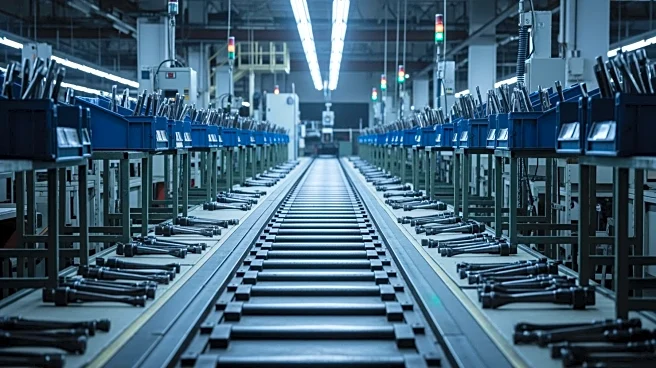What's Happening?
Uralvagonzavod, a key player in Russia's military-industrial complex, has announced plans to cut approximately 10% of its workforce and reduce production volumes by February 2026. This decision affects the metallurgical and railcar-assembly sectors, as well
as administrative departments. The Center for Countering Disinformation at the National Security and Defense Council of Ukraine reported these developments, highlighting the strain on Russia's defense industry. Previously, Uralvagonzavod had implemented a four-day workweek in some divisions. The plant is known for manufacturing T-90 tanks and other military equipment, and the reduction in personnel suggests challenges within Russia's military economy.
Why It's Important?
The decision by Uralvagonzavod to cut its workforce and production signals significant economic challenges within Russia's defense sector. This move reflects broader issues in Russia's military economy, which has been under strain due to prolonged conflict and geopolitical pressures. The reduction in production capacity could impact Russia's ability to sustain its military operations, potentially affecting its strategic capabilities. Additionally, large state-owned companies like Gazprom and Rosneft are reportedly facing substantial debts, indicating wider economic difficulties. These developments may influence global perceptions of Russia's economic stability and military readiness.
What's Next?
As Uralvagonzavod proceeds with its workforce and production cuts, the Russian government may need to address the underlying economic challenges facing its defense industry. Potential responses could include restructuring efforts or seeking alternative funding sources to stabilize key sectors. The international community will likely monitor these developments closely, as they could affect Russia's geopolitical strategies and military engagements. Furthermore, the economic strain on major state-owned enterprises may prompt broader policy changes to mitigate financial risks and ensure long-term sustainability.
Beyond the Headlines
The reduction in workforce and production at Uralvagonzavod highlights the ethical and strategic dilemmas faced by countries engaged in prolonged conflicts. The strain on Russia's defense industry raises questions about the sustainability of military-driven economies and the long-term impacts on civilian sectors. Additionally, the financial challenges faced by major Russian companies could lead to shifts in global economic dynamics, affecting trade relations and investment flows. These developments underscore the interconnectedness of military and economic policies in shaping national and international landscapes.
















